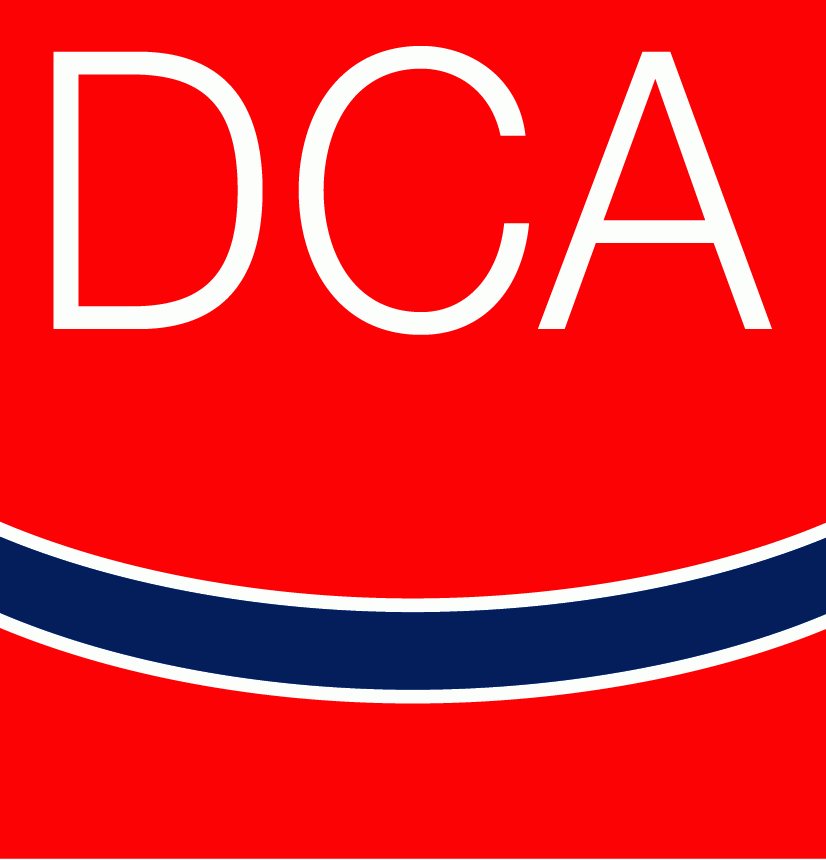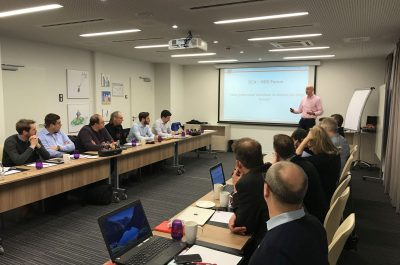
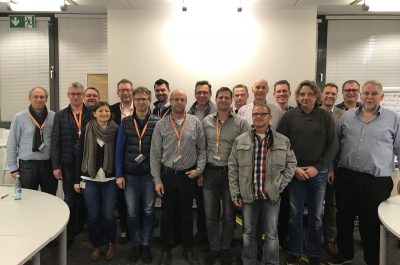
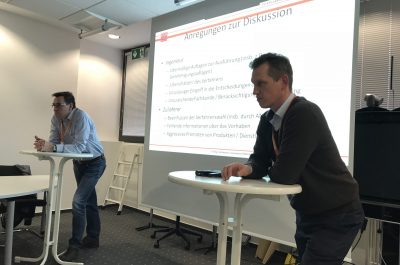
Recommendation – Education – Networking
Members‘ Forum
Since January 2018, the DCA has been offering a new event, the so-called DCA Members‘ Forum HDD Technology. The forum offers a platform for members of the association to exchange experiences and is primarily aimed at site managers and machine operators, but is also open to interested technical supervisors, planners and Clients as well as interested parties from the supplier industry.
Participation in the forum is free of charge and reserved exclusively for members. From 2022, the event is held in parallel in two linguistically separate rooms (German-speaking/English-speaking groups).
We would like to cordially invite you to the DCA Members’ Forum 2024, which will take place on Thursday, 25th April, 2024 in the imperial city of Aachen. On the evening before, the DCA also invites you to a “get-together” including dinner.
The motto of the forum is “Grouting the annular space”.
Registration for the Members’ Forum will be exclusively digital! Participation is free of charge and reserved for DCA members only.
The registration link will be sent to members in a members’ info.
Registration deadline is 22.03.2024
If you have any questions regarding registration, please do not hesitate to contact Mrs Antje Quante.
On 03.05.2023 the members of the DCA met for the 4th time for the forum “HDD technology” in Aachen. Only in 2018 the opening event of the forum took place in Essen at Open Grid. Also the “Get together” on invitation of the DCA on the eve of the forum in the restaurant Elisenbrunnen in the heart of the imperial city was very well received and used by many for an exchange of experiences. A successful start to the event.
In recent years, the forum has featured a wide variety of topics such as “HDD trouble shooting”, “requirements for small bore technology”, “new trenchless techniques in the HDD environment” and “use of downhole tools”. The annual members’ forum is primarily aimed at decision-makers, project and site managers, technical supervisors as well as planners and clients of DCA member companies, but is also open to foremen and equipment operators trained in accordance with GW 329 from the HDD drilling technology. Participation is free of charge and reserved for DCA member companies.
During the all-day forum, which was very well attended this year with more than 50 participants, the members of the association were able to inform themselves about the topic “Accuracies in HDD drilling” and join in the discussion. Once again, numerous member companies were involved in the preparations leading up to the event.
As last year, the event in the rooms of the Novotel in Aachen took place in two linguistically separate rooms. Jörg Himmerich, who is in charge of organizing the annual member forum, and Scott Stone led the English-language part. President Jorn Stoelinga and Ronald Siebel moderated the German-speaking group.
The topic of “Accuracies in HDD Drilling” was already on the agenda at the association’s 26th DCA Annual Meeting in 2022 in Stratford-upon-Avon, UK as HDD Workshop 2. There, lively discussions were held on, among other things, the different measurement methods. Due to the limited time and the great interest in the membership, the topic was then continued in the area of the annual member forum of the association.
The accuracy of a controlled horizontal borehole is one of the most important quality features of this closed construction method. After all, the borehole should be drilled with the greatest possible accuracy along a planned bore line of varying length and the desired target point should be reached! There are a number of hurdles to overcome between the first meter drilled in the pilot hole and the final location of the pulled-in media pipe that complicate this endeavor.
The following topics were discussed during the members’ forum in a total of five working blocks:
- – Geology
- – Human factor
- – Tools
- – Drill pipe
- – Broaching
- – Tolerances
- – Flushing
The emphasis was quite different in the two groups, which were separated by language.
The discussion revealed that the measures to achieve the required accuracy can vary widely. There is no one solution. In particular, the selection of locating and surveying tools must always be made with consideration of the project boundary conditions. In all aspects, it is recommended not to design at the limit. For example, a safety margin for unforeseen events should be considered in the design of the bore line. This then offers the corresponding scope to still be able to react quickly to deviations from the target line while maintaining the bending radii. In this way, the range of deviations and also the degree of deviation can be minimized.
Furthermore, the discussion has shown that the experience and training of the personnel can have a significant influence on the accuracy.
Finally, it remains to be noted that the member forum HDD technology has meanwhile developed into a fixed component in the service catalog of the DCA. It is gratifying to note the great response from members during the preparation phase, which makes discussion forums of this kind possible in the first place.
Here’s to a new one in 2024!
4. DCA-Mitgliederforum mit Rekordteilnahme – Thema: Einsatz von Werkzeugen im Bohrloch
The 4th DCA Member Forum, which took place in Aachen at the beginning of May 2022 under the topic “Use of tools in the borehole”, had a new record participation of about 50 participants from different countries. For the first time the forum which was designed exclusively for DCA members, was held in two linguistically separate groups, analogous to the workshops at the annual congress.
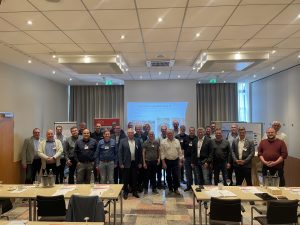
First of all, a big praise has to be addressed to all members who have significantly prepared this forum in various M-Teams meetings. The two moderators President Jorn Stoelinga (English-speaking group) and board member Jörg Himmerich (German-speaking group) had asked by circular mail for cooperation in the preparation. In the end, a total of 19 members took part in the preparation. Among many others, HDD veteran Günter Kruse, LMR Drilling GmbH, who shortly before his upcoming retirement did not miss the opportunity to share his rich experience with the participants.
After the cancellation of the event at the beginning of 2021 due to corona, the board of the DCA had deliberately placed the forum in the month of May in combination with the regular board meeting in order to achieve synergy effects on the one hand and to avoid another cancellation on the other hand. This decision was crowned with success. With one exception, the board meeting on the day before the member forum could be held with a full complement of members. Vice President Atef Khemiri, the board member responsible for large-scale drilling technology, joined the meeting from Africa by video. During the meeting, among other things, the course was set for the annual congress in the UK and new members were again admitted. In addition, the processing of the final report on the topic of “coating” and the “finalization of the new guidelines” were pushed. The aim is to finally conclude both topics in the course of the second half of the year.
Following the all-day board meeting, a pre-event meeting with a joint dinner was held at the Luna restaurant in Aachen. With a few exceptions, all participants of the Forum gratefully accepted the invitation of the DCA. The restaurant offered the appropriate ambience. The need for communication among the participating members was so great that the rather poor acoustics in the hall were topped by the intense conversations. However, the evening ended as usual in DCA circles at the bar of the conference hotel and there was talk shop until late. The actual member forum then took place the following day at the conference hotel.
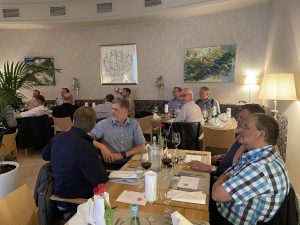
In the two language-separated groups, a total of five one-hour blocks were filled with interesting presentations and discussions: The overarching theme was “the use of tools in the borehole,” with the first block serving to explain how tools work in general: How is a drill head controlled, how do the different reamers actually work, and why do different ground conditions require different tools. The following four other topic blocks explained in more detail the different soil conditions and their specific tools. Each block was moderated by one or two members who were also involved in the preparation of the respective block.
In the English language version, hosted by our President Jorn Stoelinga, more than half of the participants had also been involved in the preparations. Nevertheless, the discussions were vivid, and the exchange of thoughts was very open. Regarding some tools there was general agreement that these were either very good, or nobody could understand why these were ever manufactured. However, with regards to the use of air hammers, the representative of Vermeer shared some interesting experiences, including reaming with air hammers.
Roller cones, how they operate and their classification, both in bits and reamers were discussed in great detail and compared with PDC bits.
There was a clear division between the large scale drilling, both in reaming tools and pilot assemblies. The small scale suppliers were very surprised to learn that almost all large scale drilling companies in the audience were using a (worn) milled tooth bit in front of a bent sub. And with very positive results. The large scale drillers were sometimes surprised at the in their eyes strange tooling design, both for pilot and reaming, preferably with exotic names as well.
All in all, the discussions were very open, and a lot of information was shared in a professional manner.
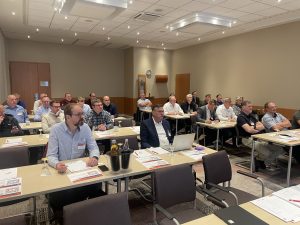
In the German workshop, just as in the English workshop, the use of the various tools was lively discussed. In Session 2, the tables of the presentation were partially filled in with the results of the discussion. According to almost all participants, Beaver-Reamer is not used. Only one participant has positive experience with this type of reamer. Participants have very little experience in the use of air hammers. The discussion showed that individual participants have limited experience with individual drilling tools. The exchange with the experiences of the other participants was therefore very positively received. As in the English group, the use of PDC bits was discussed. In homogeneous soils, fast advance can be achieved with these PDC bits. However, it could not be confirmed uniformly whether the entire drilling becomes more favorable by the use of PDC bits (faster and/or less costs).
The results of the DCA Members’ Forum and the presentations shown are available to DCA members for download in the Members’ Area. In this context it has to be pointed out that in the course of the preparation of the member forum, among other things, tables and allocations for the use of drilling tools in different ground conditions were compiled (among others use in soft soils, in rock etc.). The results/assignments compiled in the process served solely as a basis for discussion for the forum among DCA members. It is by no means a Technical Rule and thus not the basis for (contractual) legal matters (see disclaimer in the presentations).
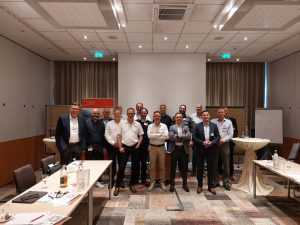 All in all, it can be said that the Member Forum 2022 in the chosen form with two language-separated groups and the pre-event meeting was very well received by the members. The board has therefore decided to hold the 2023 Forum in the same form. In addition, Aachen is to be further established as the location for the Member Forum. See you again at the beginning of May 2023 in the old imperial city!
All in all, it can be said that the Member Forum 2022 in the chosen form with two language-separated groups and the pre-event meeting was very well received by the members. The board has therefore decided to hold the 2023 Forum in the same form. In addition, Aachen is to be further established as the location for the Member Forum. See you again at the beginning of May 2023 in the old imperial city!
DCA_Members’ Forum_Program_2022
Ergebnisse des Mitgliederforums 2022:
The 3rd DCA Member Forum, which took place in Aachen under the theme “New trenchless techniques linked to HDD technology” at the end of January 2020, was well attended with 23 participants. 10 regular and 13 associate member companies, including clients from both gas pipeline construction and cable laying, took part.
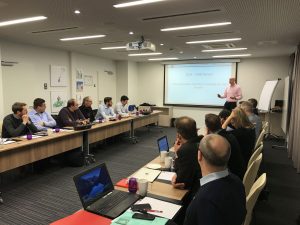
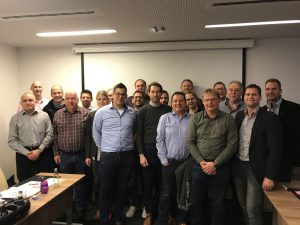
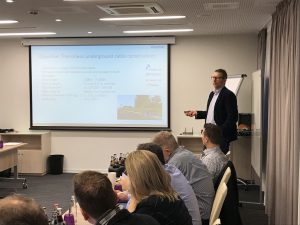
At the last annual congress in Krakow in October 2019, the Drilling Contractors Association (DCA) held a workshop on “New trenchless techniques linked to HDD-technology “, in which the areas of application of the methods as well as the advantages and disadvantages compared to the HDD technology were discussed intensively with the participants. In addition to the above mentioned points, the application limits and the costs of the individual methods were also discussed. The methods compete with HDD in the field of large and small drilling technology and complement the classical construction method. In the course of the intensive discussions, the necessary specialist knowledge for the users was discussed and answers were found to the question of which processes can usefully supplement the HDD companies’ offerings. However, it quickly became clear that there was still a need for further clarification and information among the members due to the limited time frame in the very well attended workshop.
During the event in Aachen, a total of five methods were presented and intensively discussed by parts of the board and by Jörg Himmerich of DCA member Dr.-Ing. Veenker Ingenieurgesellschaft mbH from Hannover. The methods discussed included the Direct Pipe, the E-Power Pipe, the Easy2jet, the pilot pipe jacking method and last but not least the Direct Drill method.
Points for discussion:
- What/where are the limits of each technique?
- What are the advantages and disadvantages (compared to HDD)?
- What kind of knowledge is required (HDD or Microtunneling or …)?
- Which technique(s) could be reasonable expansion for HDD companies?
- Can HDD in future improve where other methods have advantages?
These and other questions were discussed between clients, manufacturers and users during the very informative members’ forum.
The characteristics of the individual methods are listed in a table below.
DCA_Members Forum_Comparison_HDD_Results_2020
DCA_Mitgliederforum_Programm_2020
DCA_Members_Forum_Program_2020
On 05.02.2019 the second DCA member forum HDD-Technology took place this time in Aachen. The event was held as part of a workshop on the topic “Requirements for small drilling technology”. A total of 18 people took part in the members’ forum. Nine drilling companies, three planners and one client and further suppliers were present. Three participants had to cancel due to illness.
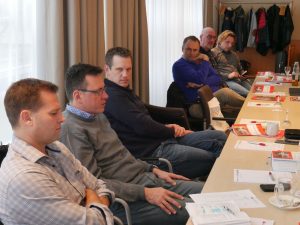
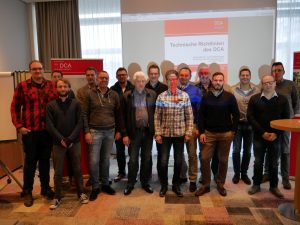
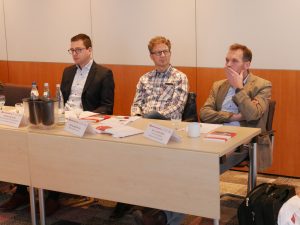
The following points were discussed:
Definition Small Scale Drilling
- an exact definition of small drilling technology – what is small drilling technology, where are the limits to large drilling technology? – is not possible
- the splitting of the HDD technology according to the tractive force of the drilling rigs (>, < 40 t) is used in HDD training/certification (GW 301/329), but is by no means valid for all HDD measures
- the complexity of the drilling is an important factor, even small drillings with short drilling lengths can be very demanding
- In Germany, so-called small drilling technology accounts for around 95% of all drilling work (drilling rigs KB: approx. 1200; GB: approx. 15).
Requirements in the DCA-Guidelines to small scale drilling technology
- By far the largest part of the requirements in the DCA guidelines applies to both large and small drilling technology.
- The statement of many HDD companies that the requirements in the guideline only apply to large drilling technology is simply wrong.
- The subject of materials in the TR: It is suggested that permissible pipe loads and qualities for PE should be supplemented.
Project classification according to degree of difficulty (see chapter 10.5.1 ff of the TR)
- In the DCA Guideline, an attempt was made to classify projects according to their degree of difficulty (originally from the 2004 QM Guideline).
- Categorization of drillings into routine, standard and complex drillings
- As a result of the discussion in the workshop it can be stated that the topic “categorisation” incl. Tables 11 ff must be completely revised.
- It is also proposed that a separate document be drawn up for categorisation. This document could serve as an aid for clients and planners in the tendering and planning of HDD measures.
- The revised categorisation is also intended to sensitise clients/planners/contractors to the requirements of HDD construction measures.
Drilling mud disposal
- Presentation of the results of the task group.
- There is no generally valid recommendation for drilling mud disposal from DCA.
- One approach proposed is the so-called Danish model for a fair solution between clients and contractors; clients must take action and conclude “contracts” with disposal companies/landfill operators; then regulate disposal in the bill of quantities via separate positions; DCA-bill of quantities should be reviewed to that effect.
- Drilling companies report on their own experiences: e.g. disposal of the drilling mud via a specialist disposal company (Maschinenring in Northern Germany) or establishment of their own specialist disposal company via which the disposal is then carried out (e.g. Beermann).
Dealing with inadequate planning on the construction site/ Dealing with unreasonable demands of the client etc.
- Various example projects on this topic will be presented and discussed. In the course of the discussion, there will be a lively exchange of experiences between all participants, which will not be further deepened here.
- The basic recommendation is given that deviations from the course of the project or additional services should be reported in writing to the client / planner in a timely manner. This also applies to planning errors in the course of the invitation to tender or during the execution of construction work.
- It is suggested that contracting authorities/planners be trained by DCA in order to raise the level of tendering and the quality of monitoring of the measures.
Conclusion: The continuation of the event in this format is expressly advocated. The topics addressed should be further explored in further events. The overall too small number of participants was criticized, especially on the part of the client.
DCA_Members’ Forum HDD_Results_2019
Since January this year the DCA offers a new event, the members‘ forum, which took place for the first time on 18th of January, 2018 in Essen. The forum offers a platform for members of the association to exchange experiences and is aimed at construction companies and executives, but is also open to interested professional supervisors, planners and contractors as well as interested parties from the supply industry. Under the motto “HDD Trouble Shooting”, the DCA has set itself the goal of building up a kind of “fault culture” within its members. Errors are not necessarily to be seen as a flaw in the performance of the service, but are much more to be understood as a deviation from the original plan. As a result, a role is also played in the case of mistakes/errors (e.g. of the geology).
The HDD drilling companies in the DCA is fairly well known the unplanned and undesired events that can cause additional work or expense in practice during the drilling operation. Lack of drilling fluids, blowers, drill pipe breakages, tool wear,… are only a few points from the multitude of problems to be solved. If possible, these experiences will be kept in the companies under lock and key. Or the experiences they have gained will be seen as a future competitive advantage and thus well guarded.
In order to increase the quality and reliability of the HDD process as a whole, these experiences should be used more and more in the volume. Finally, all active DCA members are also competing with each other, both with conventional pipe laying and with other construction projects.
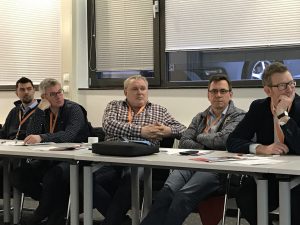
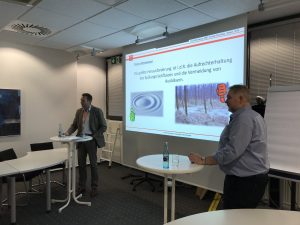
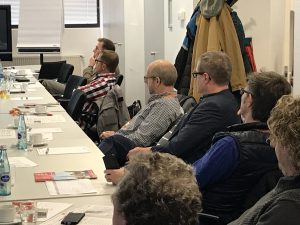
According to the participants, the first event was characterised by a lively discussion, which resulted in an exchange of experiences, both in the field of large drilling technology and for operators of small and medium-sized systems. All participants, whether drilling companies, planners, clients or suppliers, took an active part in the discussion, so that the executive board strives to further expand this format of mutual exchange, also of its own “mistakes”, for its members in the future.
In the context of the first member forum, the following content-related points were discussed/developed (excerpt):
Drilling fluids/topic blowers:
- The term “blower” has a negative connotation and should rather be avoided by experts. It is suggested that an information sheet on the subject of mud eruption be compiled (causes, technical course, boundary conditions, countermeasures, etc.). The information sheet should be distributed to the clients, agencies and planners.
Subsoil/Geology:
- the necessity of soil exploration is basically given for every HDD project (recourse to existing data, reconnaissance). In practice, unfortunately, the client often dispenses with the necessary examinations. The result: a supposedly cheaply purchased construction work becomes more expensive in the end than if it were properly planned right from the start.
- If the ground in the project is different than planned, prompt coordination with the client is recommended (keyword: notice of obstruction).
- The quality of the subsoil report must still be improved (keyword: further training for planners and clients)
Cooperation clients/planner/drilling company/supplier:
- The training of clients and planners for the HDD procedure is suggested (last training took place in 2012, keyword HDD quality assurance from the client’s point of view)
- The topic of railway crossing using HDD should be discussed in the HDD discussion forum.
Coating:
- This topic is currently being discussed in working group 2 “coating”.
- The responsibilities regarding coating must be clearly defined in a project; in practice there are different models.
- The quality of the coating must be adapted to the requirements resulting from the subsoil. This is often not the case.
- Damage often occurs on the post-coating; quality requirements must be observed.
Equipment:
- Quality and maintenance of the tools used is always the responsibility of the contractor; there are various procedures for testing:
- Within the scope of quality assurance, every company must have a system for self-monitoring of equipment (maintenance, wear, material fatigue, etc.)
